Hawaii Documents
Quitclaim Deed
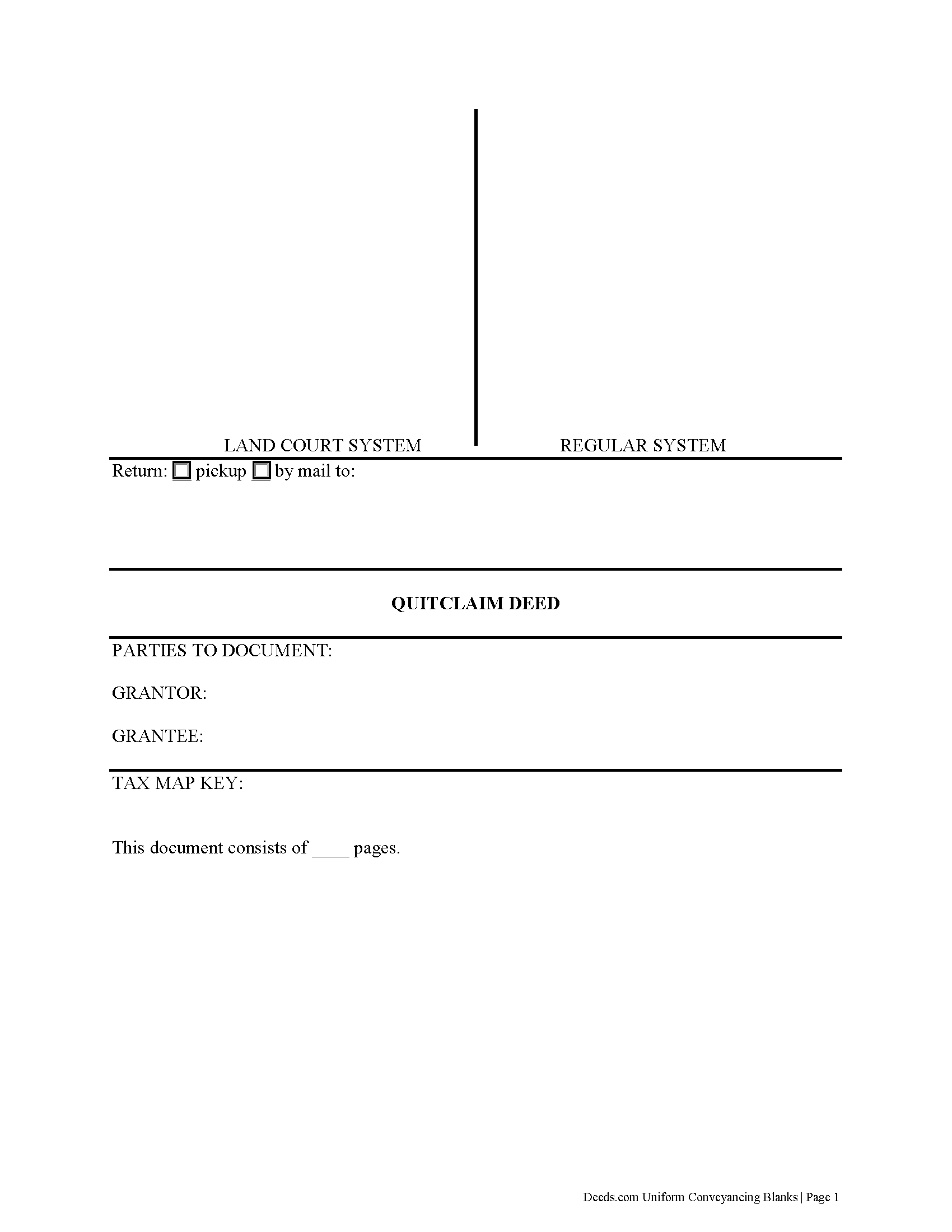
A quitclaim deed is a legal document used to transfer, or convey, rights in real property from a grantor (seller) to a grantee (buyer). In this type of deed, the grantor does not warrant that he or she owns the property; the grantor is only transferring the property. As there is no guarantee of a clear title, quitclaim deeds provide very little protection for grantees. Once acknowledged or proved and certified as provided, record the deed with the Bureau of Conveyances (BOC) office where the property is located.
Hawaii maintains two separate systems for recording: Land Court (Torrens) and Regular System. The BOC processes documents for both Land Court and Regular System. Check the prior deed to determine which system to record in. A label appearing in the upper left-hand corner signifies recording in the Land Court system; a label in the upper right-hand corner signifies recording in the Regular System. If both sides contain labels, the deed is dual-system recorded. Make sure to record in the correct system, and consult the BOC or an attorney with any questions. Registered land, and the ownership thereof, is subject to the same burdens and incidents that are attached to unregist... More Information about the Hawaii Quitclaim Deed
Gift Deed

Gift deeds convey title to real property from one party to another with no exchange of consideration, monetary or otherwise. Often used to transfer property between family members or to gift property as a charitable act or donation, these conveyances occur during the grantor's lifetime. Gift deeds must contain language that explicitly states that no consideration is expected or required. Ambiguous language, or references to any type of consideration, can make the gift deed contestable in court.
A lawful gift deed includes the grantor's full name, marital status, and mailing address, as well as the grantee's full name, marital status, vesting information, and mailing address. Vesting describes how the grantee holds title to the property. Generally, real property is owned in either sole ownership or co-ownership. For Hawaii residential property, the primary methods for holding title are tenancy in common, joint tenancy, and tenancy by the entirety. An estate conveyed to two or more people, including spouses, is considered a tenancy in common, unless the conveying instrument explicitly expresses otherwise (Haw. Rev. Stat. 509-1).
As with any conveyance of realty, include a comp... More Information about the Hawaii Gift Deed
Warranty Deed
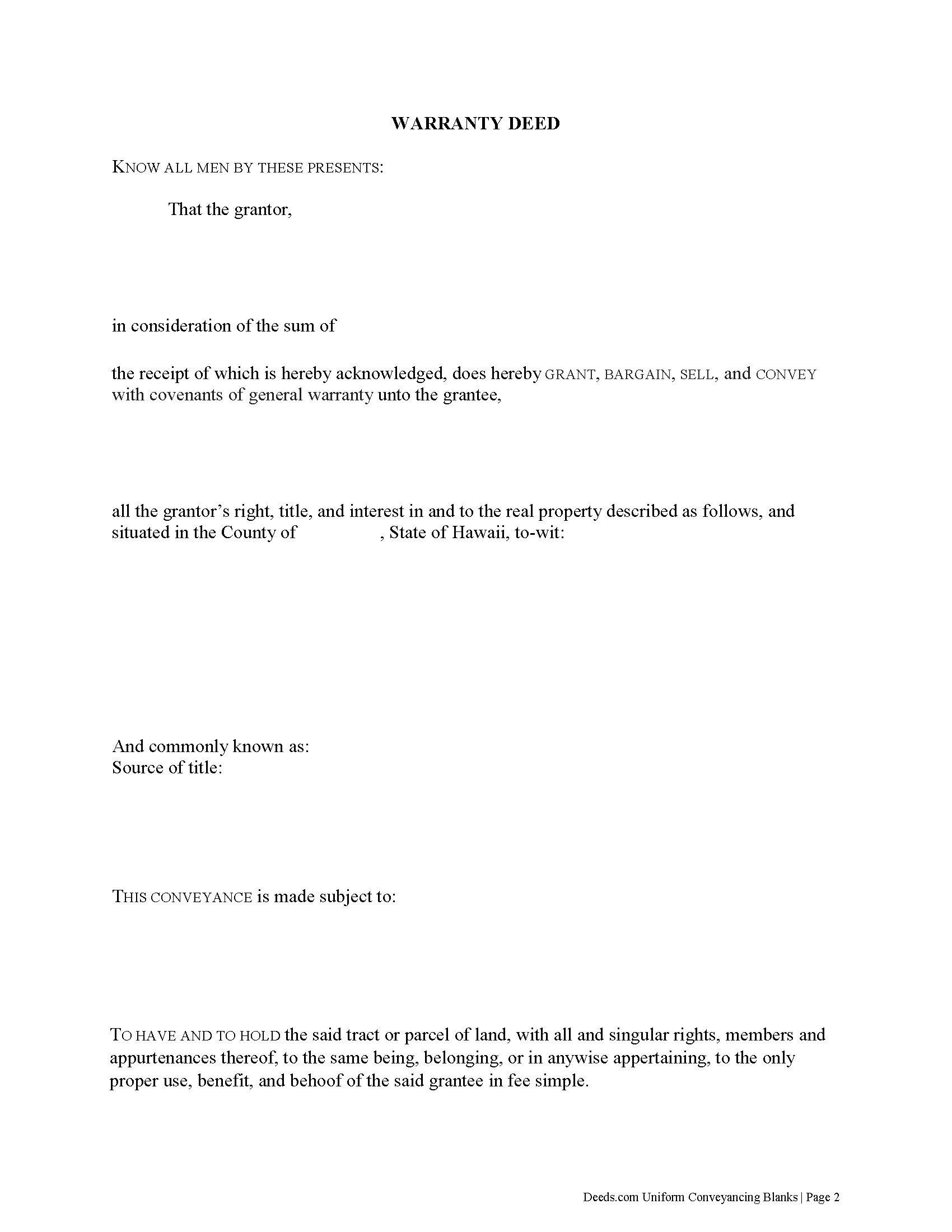
A warranty deed is a legal document used to transfer, or convey, rights in real property from a grantor (seller) to a grantee (buyer). This type of deed provides protection for the grantee by guaranteeing that the grantor holds clear title to the real estate and has the right to sell the property to the grantee. This guarantee extends throughout the property's history. The grantor also guarantees that they did not encumber the property in a way prohibiting transfer, and that the deed reference all easements, restrictions, or other agreements of record that relate to the specific parcel of land. A warranty deed, once acknowledged or proved and certified as provided, should be recorded in the recorder's office in the county where such lands are located.
Hawaii maintains two separate systems for recording: Land Court (Torrens) and Regular System. The Bureau of Conveyances records for both Land Court and Regular System. Check the prior deed to determine which system to record in. A label appearing in the upper left-hand corner signifies recording in the Land Court system; a label in the upper right-hand corner signifies recording in the Regular System. If both sides contain labels, ... More Information about the Hawaii Warranty Deed
Special Warranty Deed
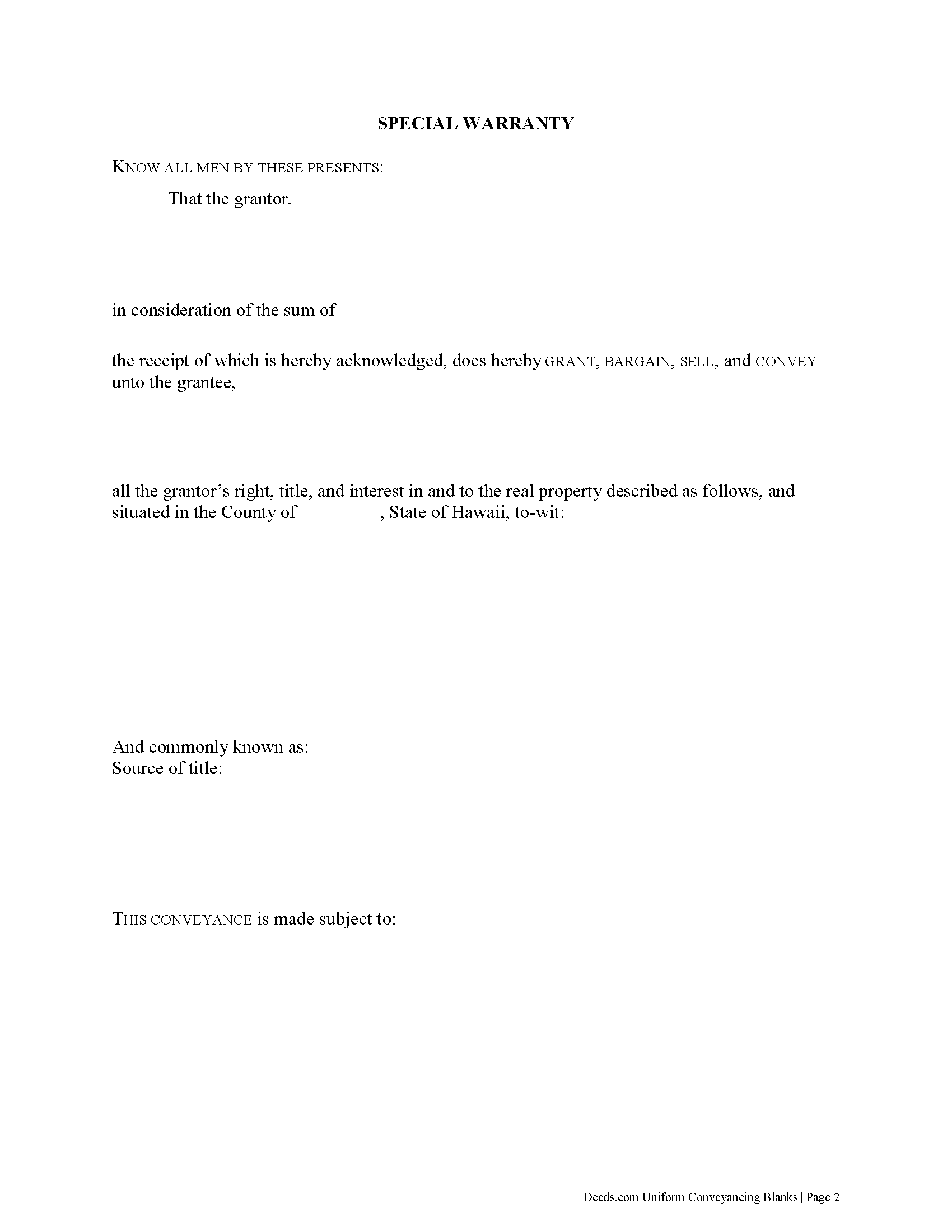
A special warranty deed is a legal document used to transfer, or convey, rights in real property from a grantor (seller) to a grantee (buyer). Also referred to as a limited warranty deed, this type of deed provides significant liability protection for the grantor, and less protection for the buyer. In a special warranty deed, the grantor only warrants against defects in the title during his or her ownership, and that he or she is authorized to sell the subject property; it does not guarantee that there are no other claims on the title from before the grantor owned the property. Because of the risk of unknown claims on the title, special warranty deeds are unusual for residential real estate transactions. A special warranty deed, once acknowledged or proved and certified as provided, should be recorded in the recorder's office in the county where such lands are located.
Hawaii maintains two separate systems for recording: Land Court (Torrens) and Regular System. The Bureau of Conveyances records for both Land Court and Regular System. Check the prior deed to determine which system to record in. A label appearing in the upper left-hand corner signifies recording in the Land Court ... More Information about the Hawaii Special Warranty Deed
Grant Deed
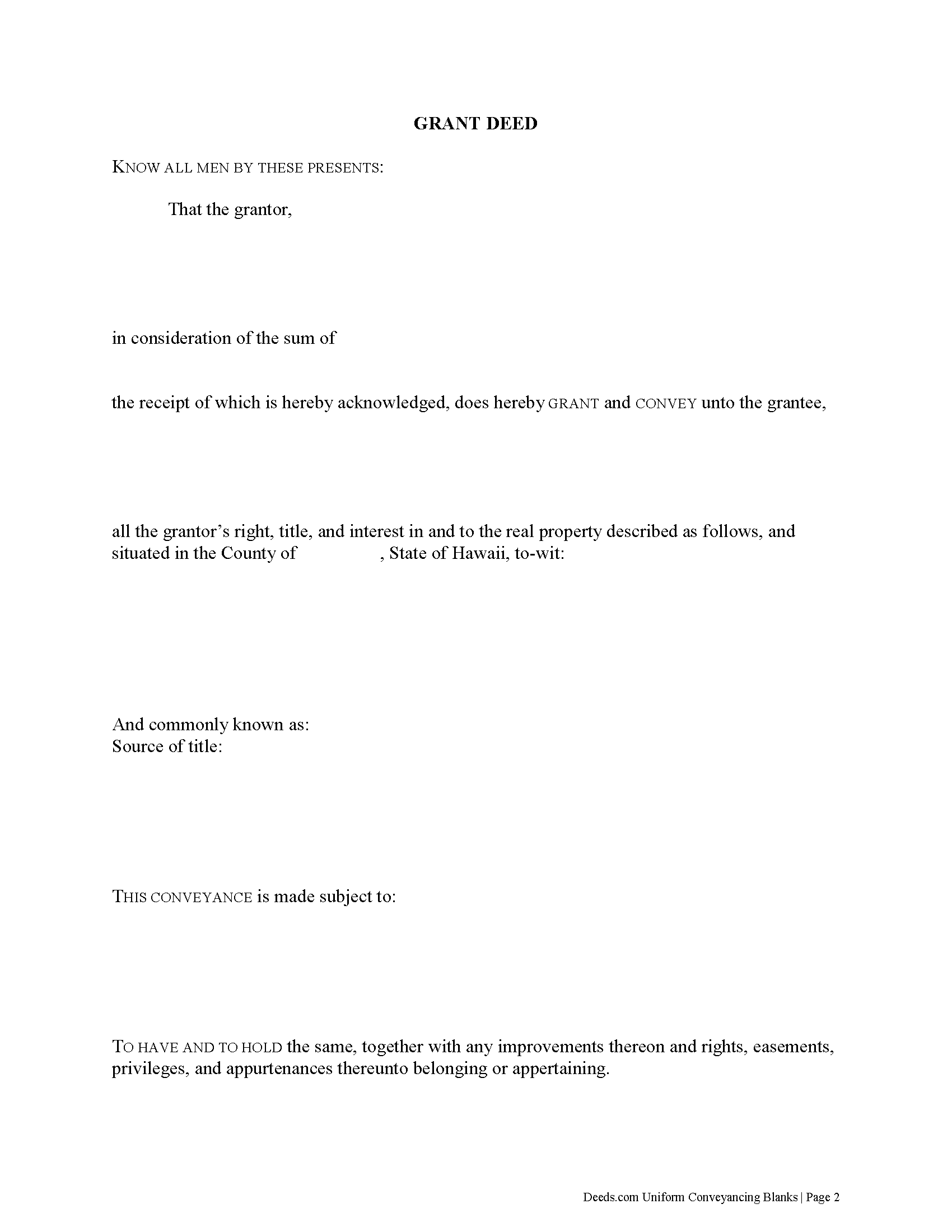
A grant deed is a legal document used to transfer, or convey, rights in real property from a grantor (seller) to a grantee (buyer). Also referred to as a bargain and sale deed, this type of deed provides the grantee with less protection than a warranty deed, but more than a quitclaim deed. In a grant deed, the grantor warrants that he or she is the owner, and that he or she has not previously conveyed the property. It also guarantees that the property is not burdened by any encumbrances other than the ones stated in the deed. These warranties are not explicitly stated and are called "implied warranties". Therefore, if the grantee later discovers that the grantor has sold the property to a third party, or if there are encumbrances not mentioned in the deed, the grantee can sue the grantor to recover the value of the property. A grant deed, once acknowledged or proved and certified as provided, should be recorded with the BOC.
Hawaii maintains two separate systems for recording: Land Court (Torrens) and Regular System. The Bureau of Conveyances (BOC) records for both Land Court and Regular System. Check the prior deed to determine which system to record in. A label appearing in th... More Information about the Hawaii Grant Deed
Correction Deed
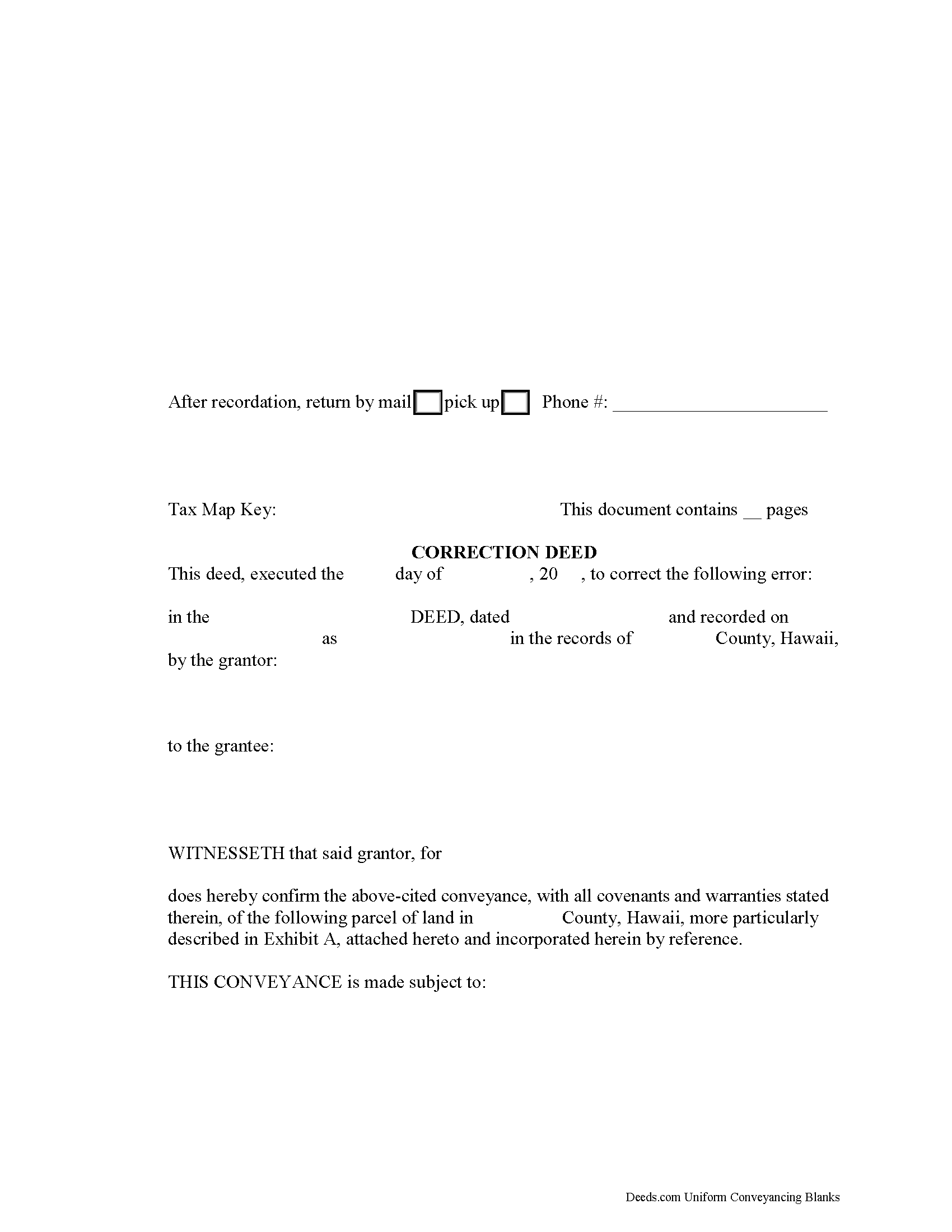
Use the correction deed to correct an error in a previously recorded deed of conveyance in Hawaii.
Errors in a previously recorded deed can be corrected by preparing and recording a correction deed. This helps to prevent title flaws, which may cause problems when the current owner attempts to sell the property. The correction deed does not convey title; instead, it confirms the prior conveyance.
The corrective deed must be executed from the original grantor to the original grantee. Apart from supplying the corrected information, it must identify the reason for correcting and reference the prior deed by date, recording number (book and page or document number), and place of recording.
For small errors in various sections of the prior deed, such as typos and minor omissions of names or parts of names, marital status, or spouse's information, a correction deed is the right vehicle. When correcting the legal description, have both the grantor and the grantee sign the corrective deed and confirm the correction.
For certain types of changes, a correction deed may not be appropriate. Adding or removing a grantee, for example, or making material changes to the legal descript... More Information about the Hawaii Correction Deed
Easement Deed
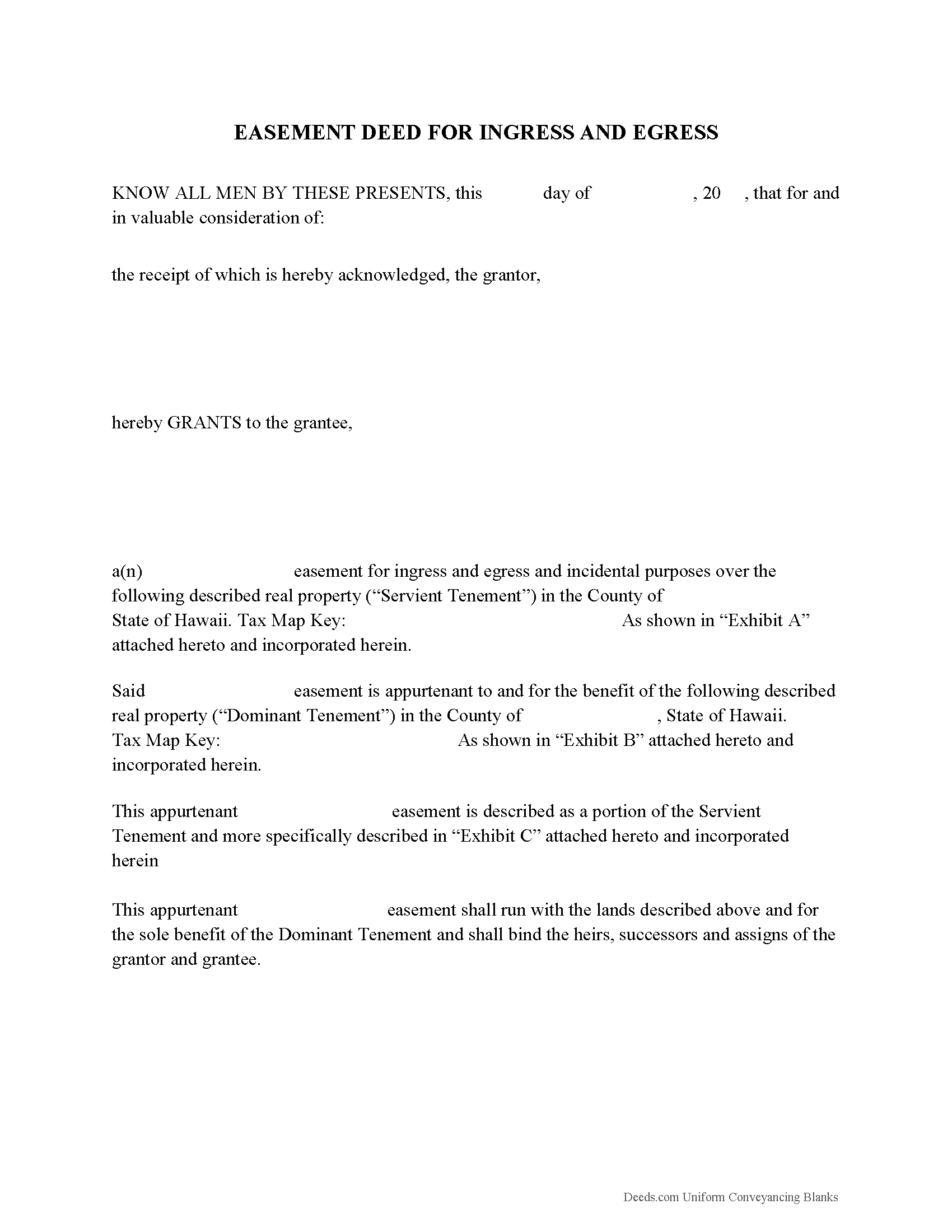
An easement is a non-possessory property interest that one person has in land owned by another; and the easement deed entitles the holder of the instrument to a specific limited use or enjoyment of the owner's land. Hawaii easements are either appurtenant or in gross.
Conservation easements are interests in real property created by deed, restrictions, covenants, or conditions, and are another type of easement used in Hawaii. The purpose of this type of easement is to preserve and protect the natural, scenic, forested, or open-space conditions of land; preserve and protect the structural integrity and physical appearance of cultural landscapes, resources, and cites which perpetuate indigenous native Hawaiian culture; preserve and protect historic properties as defined in 6E-2 and traditional family cemeteries; and preserve and protect land for agricultural use (198-1).
An easement deed is subject to the same conditions that apply to other real property documents in Hawaii. It must be signed by the grantor and acknowledged in the manner required by statute. The acknowledgement must be taken by an authorized individual and should be endorsed on the instrument or attached to it i... More Information about the Hawaii Easement Deed
Termination, Cancellation of Easement / Right of Way
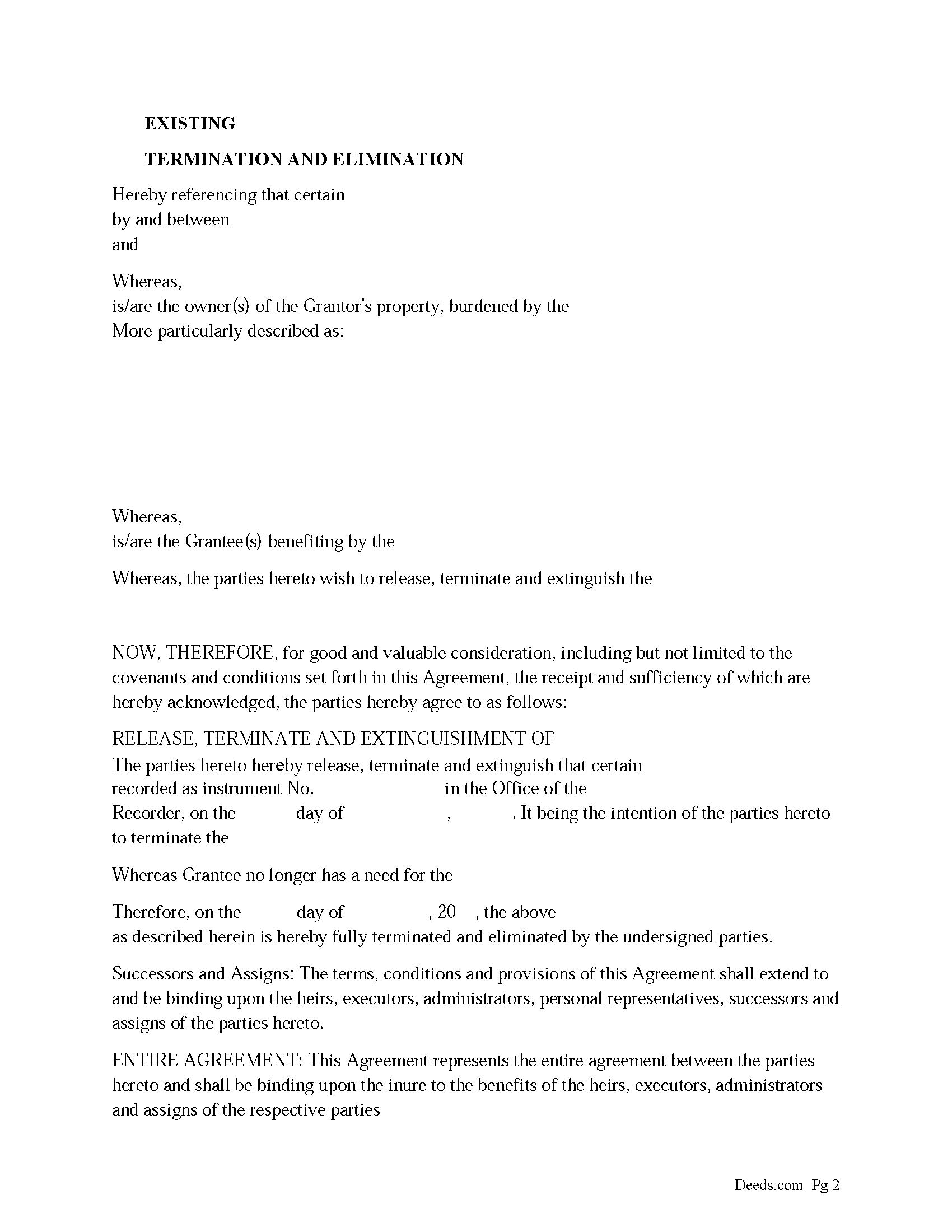
Use this form to release, terminate, extinguish a previously recorded document that involves access to and from a property.
Documents such as:
1. Easement Deeds or Agreements (An easement is a non-possessory interest in land, granting the right to use someone else's property for a specific purpose, like a driveway or utility line)
2. Access Roads
3. Right of Ways
4. Utility Easements (Power, Gas, Water, Sewer, Etc.)
5. Drainage Easements
This document allows the owner of the land, burdened by the access and the party that benefits from the access, to sign an agreement releasing the property from such access, ... More Information about the Hawaii Termination, Cancellation of Easement / Right of Way
Mortgage Agreement and Promissory Note
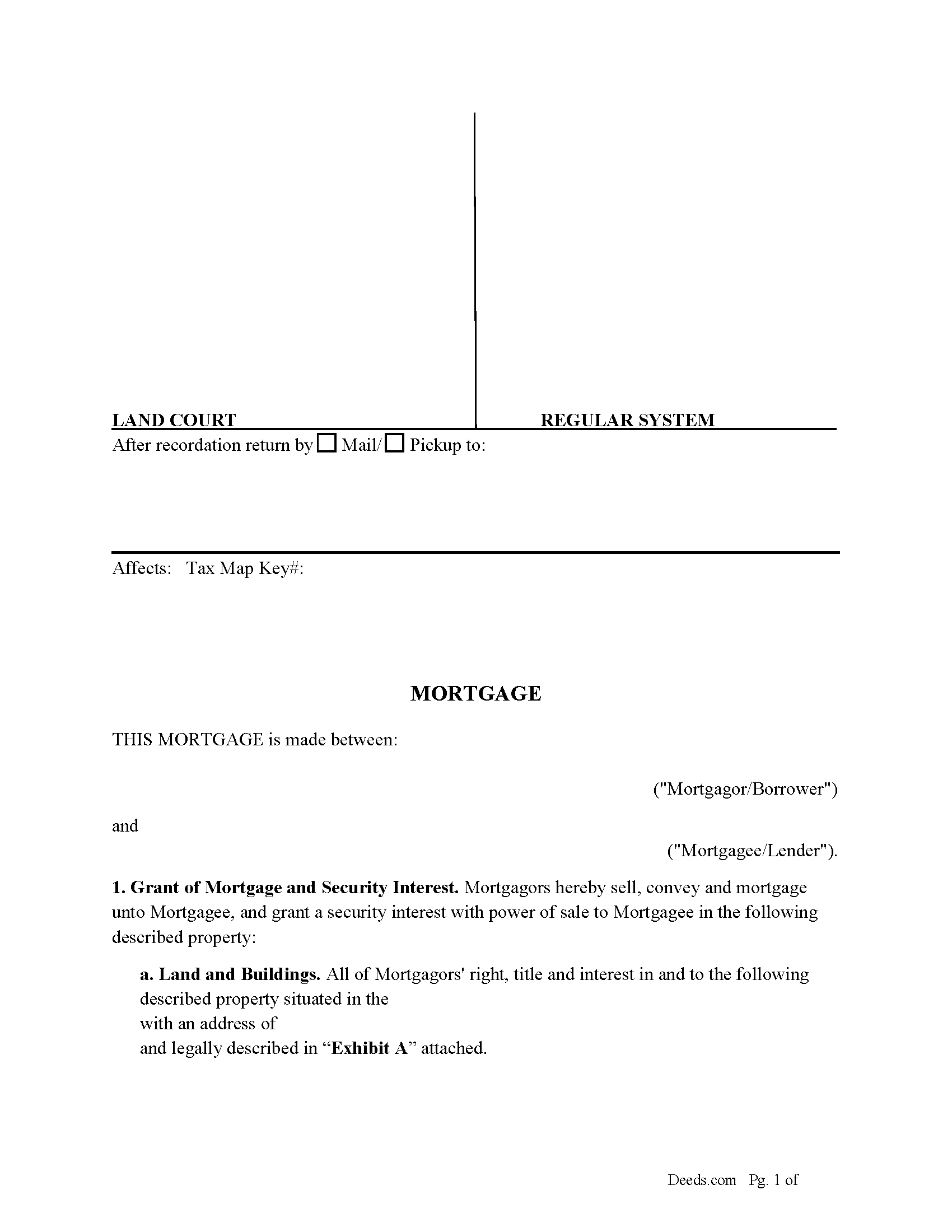
Use these forms to finance/mortgage real property-residential, rental, condominiums, second homes, vacant land and planned unit developments.
This form can be used for Torren's property, recorded in Land Court, abstract property-recorded in Regular Court or Dual System recording, property recorded in both systems at the Bureau of Conveyances, located in Honolulu.
This form includes a power of sale clause, allowing for a non-judicial foreclosure in the case of default, a mortgage and promissory note with stringent default terms can be beneficial to the lender.
For use in Hawaii only.
... More Information about the Hawaii Mortgage Agreement and Promissory Note
Release of Mortgage
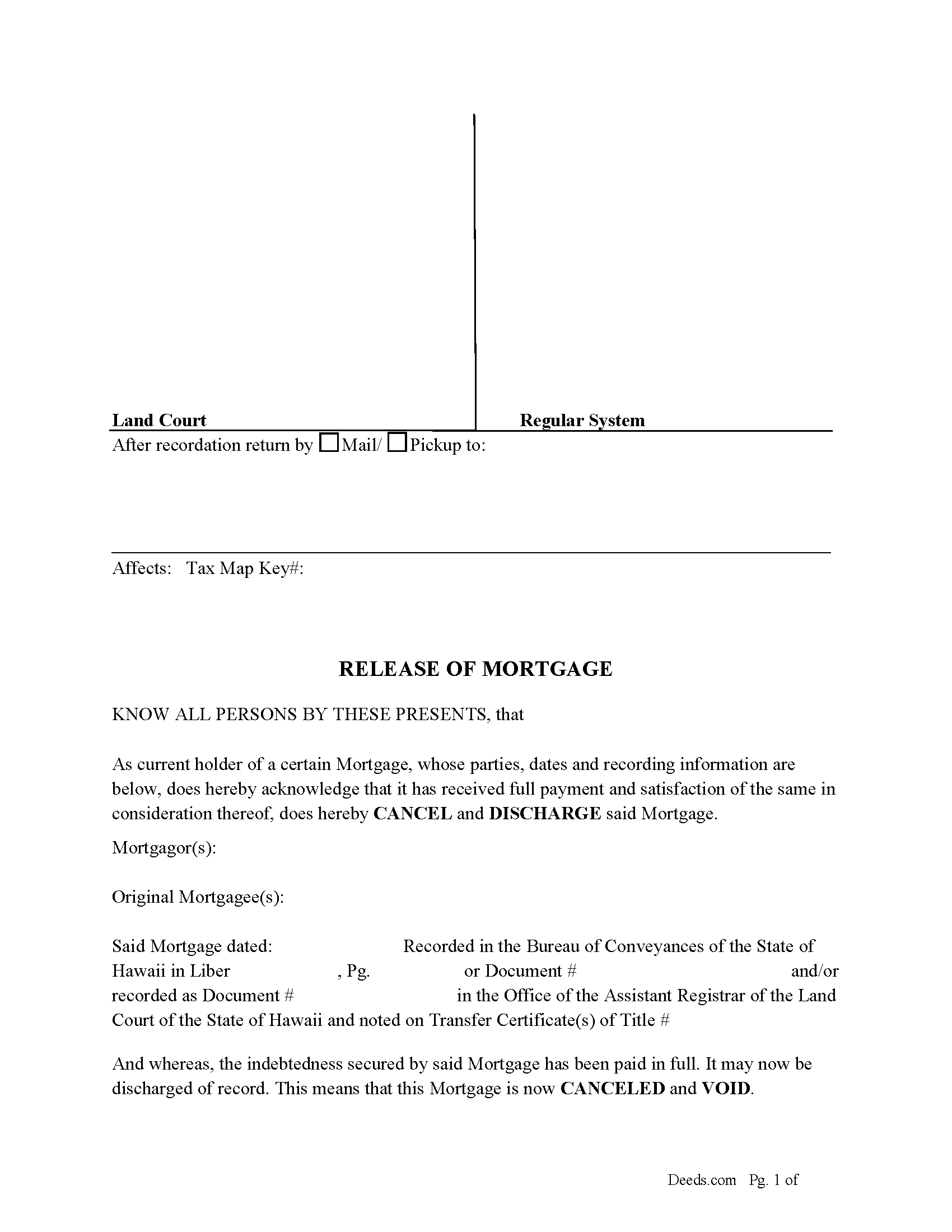
This form is used by the current holder/lender or representative to release a recorded mortgage document upon satisfaction/paid in full. The release of mortgage typically has to be filed within 60 days to avoid penalty. This form is formatted for recording in Land Count, Regular System or the Dual System of Hawaii. (The mortgagee of real property or the record assignee of a mortgage interest shall provide to the mortgagor a release of mortgage upon full satisfaction of the mortgage and discharge of any secured debt. If the debt secured by the mortgage is also secured by an assignment of the borrower's or mortgagor's interest in leases or rents to the mortgagee, then the mortgagee or record assignee shall also provide to the borrower or mortgagor, as applicable, a reassignment or release of the security interest upon full satisfaction and discharge of the secured debt. The instrument or instruments shall be duly acknowledged, shall sufficiently describe the mortgage or assignment that has been satisfied, and be recordable in the bureau of conveyances or office of the assistant registrar of the land court, or both, as appropriate.) (HI Statute 506-8(a))
For use in Hawaii only.
... More Information about the Hawaii Release of Mortgage
Assignment of Mortgage
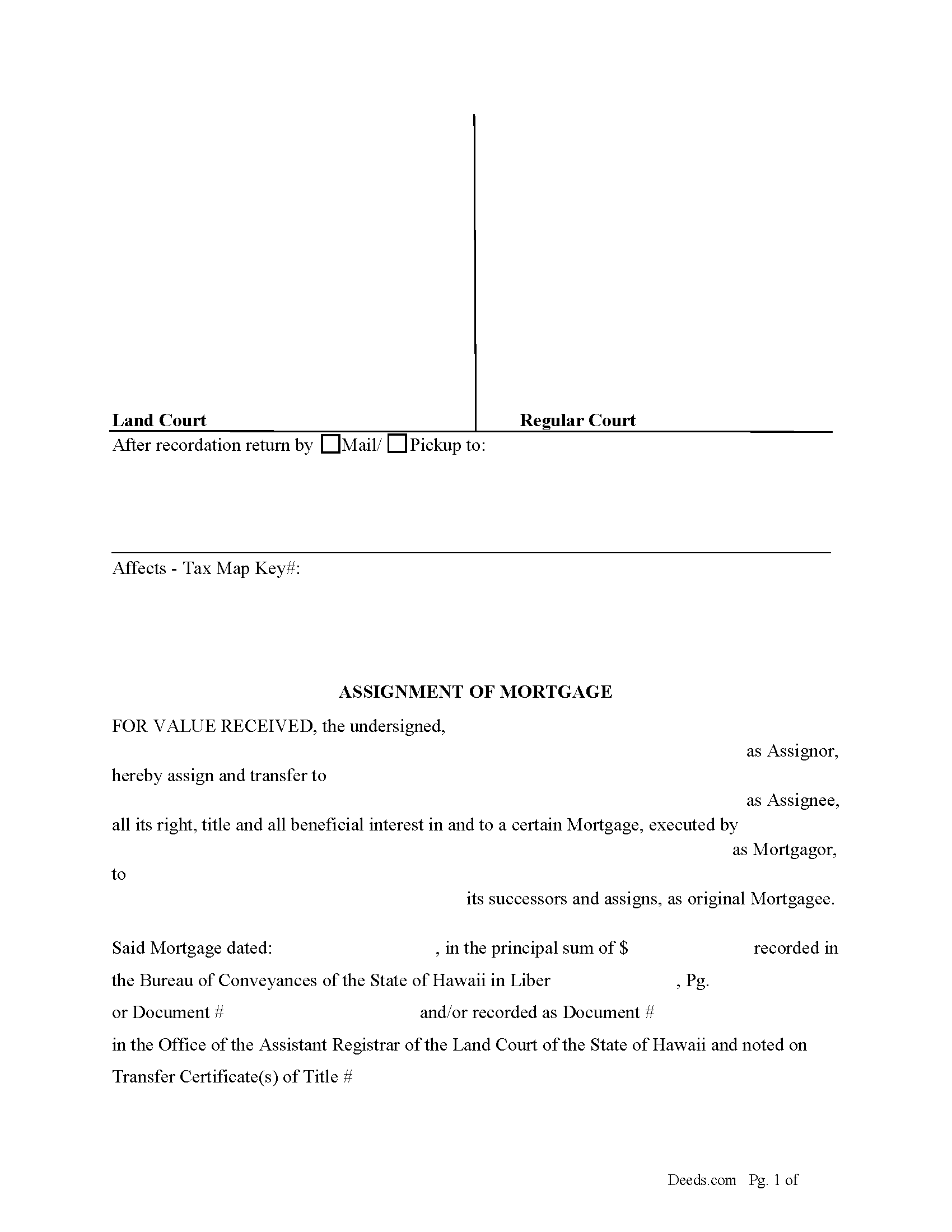
This form is used to assign a previously recorded mortgage to another party, common when an existing mortgage has been sold. Formatted for use in Hawaii's land court, regular system or dual system recording process.
506-8 Release of mortgages of real property or fixtures and reassignment of security interests
(a) The mortgagee of real property or the record assignee of a mortgage interest shall provide to the mortgagor a release of mortgage upon full satisfaction of the mortgage and discharge of any secured debt. If the debt secured by the mortgage is also secured by an assignment of the borrower's or mortgagor's interest in leases or rents to the mortgagee, then the mortgagee or record assignee shall also provide to the borrower or mortgagor, as applicable, a reassignment or release of the security interest upon full satisfaction and discharge of the secured debt. The instrument or instruments shall be duly acknowledged, shall sufficiently describe the mortgage or assignment that has been satisfied, and be recordable in the bureau of conveyances or office of the assistant registrar of the land court, or both, as appropriate.
(b) If the mortgagee or record assigne... More Information about the Hawaii Assignment of Mortgage
Transfer on Death Deed
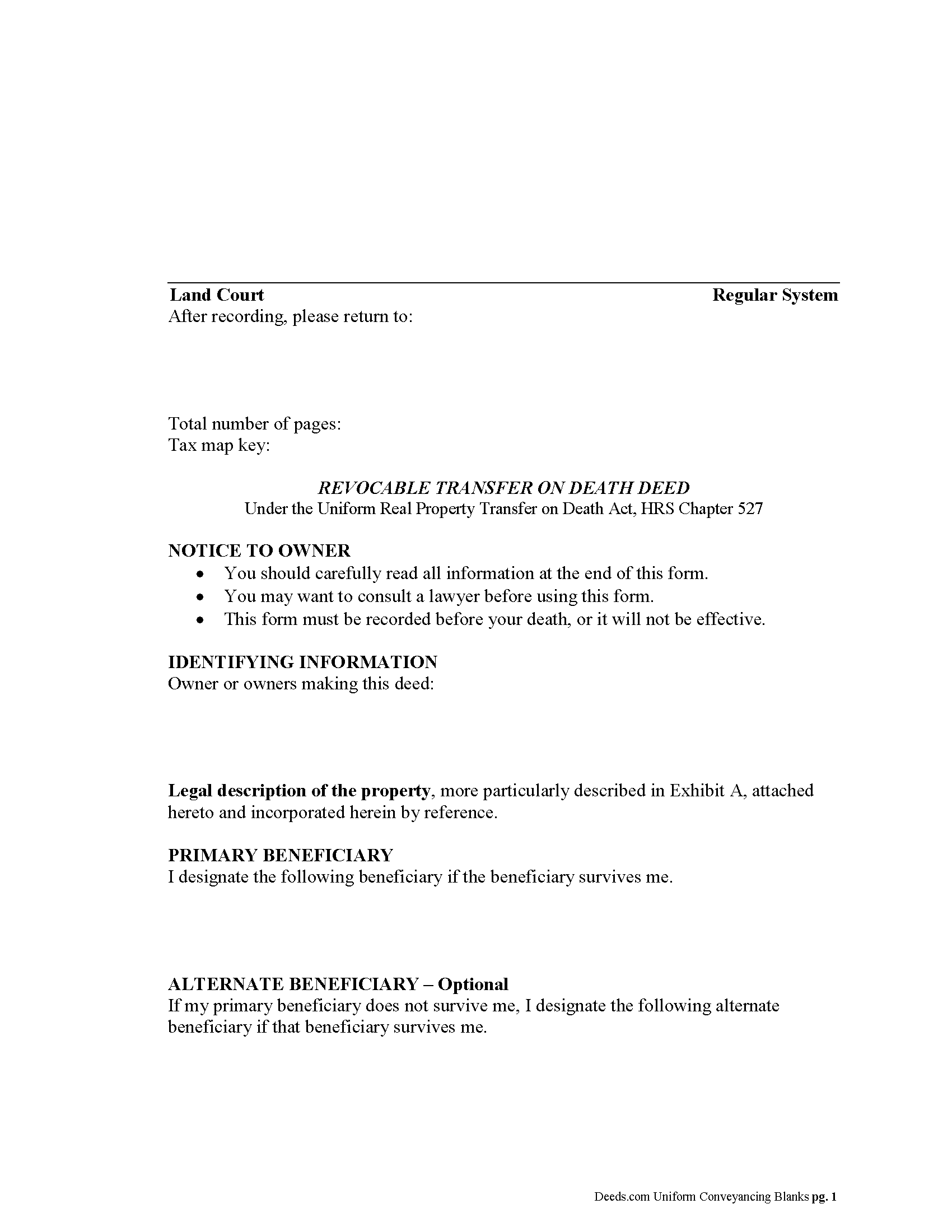
Transfer on Death Deeds in Hawaii
In 2011, Hawaii enacted its version of the Uniform Real Property Transfer on Death Act (URPTODA), found at Chapter 527 of the Hawaii Revised Statutes.
Along with Hawaii, a growing number of states are choosing to adopt the provisions of the URPTODA. The new law allows landowners to direct the distribution of what is often their most significant asset, their real estate, with a correctly executed and recorded transfer on death deed.
Transfer on death deeds are nontestamentary, which means ownership of the property passes to the beneficiary without instructions in a will or the need for probate (5277). Unnecessary conflicts are likely to add confusion and expense, however, so property owners should take care to ensure that their wills and TODDs contain the same instructions.
Hawaii's version of the URPTODA sets out the specific requirements for lawful transfer on death deeds:
The capacity required to make or revoke a transfer on death deed is the same as the capacity required to make a will (5278, 560:2-501).
It must contain the essential elements and formalities of a properly recordable inter vivos deed, such as warranty or quitcla... More Information about the Hawaii Transfer on Death Deed
Transfer on Death Revocation
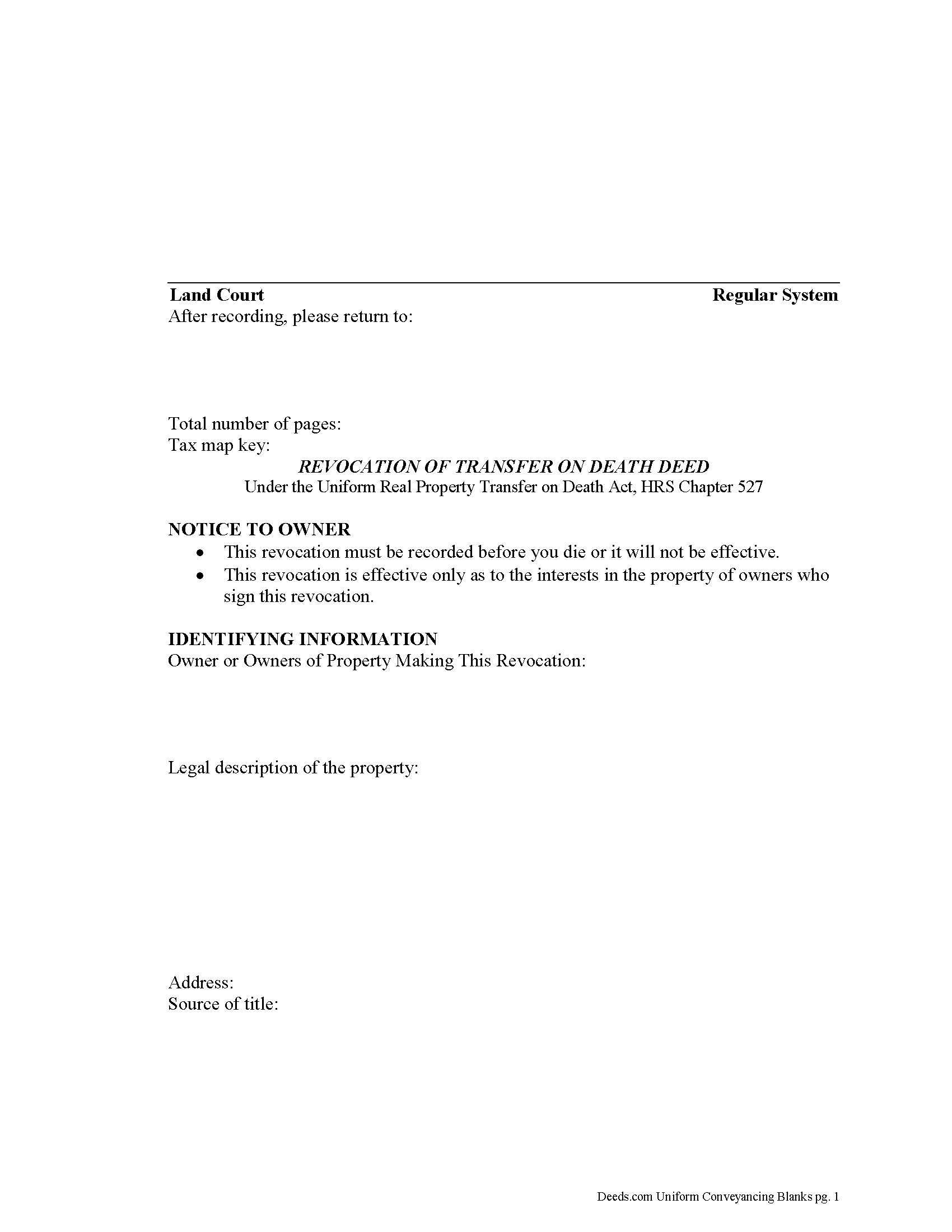
In 2011, Hawaii enacted its version of the Uniform Real Property Transfer on Death Act (URPTODA), found at Chapter 527 of the Hawaii Revised Statutes.
Along with Hawaii, a growing number of states are choosing to adopt the provisions of the URPTODA. The new law allows landowners to direct the distribution of what is often their most significant asset, their real estate, with a correctly executed and recorded transfer on death deed (TODD).
Transfer on death deeds are nontestamentary, which means ownership of the property passes to the beneficiary without instructions in a will or the need for probate (5277). Unnecessary conflicts are likely to add confusion and expense, so property owners should ensure that their wills and TODDs contain the same instructions.
The named beneficiary gains no present rights to the property, only a potential future interest. Instead, the transferors retain absolute control during their lives. This includes the freedom to use the property in any lawful manner, to sell or transfer it to someone else, and to modify or revoke the intended transfer on death (52712). These details, along with the fact that TODDs only convey the property rights remai... More Information about the Hawaii Transfer on Death Revocation
Affidavit of Death
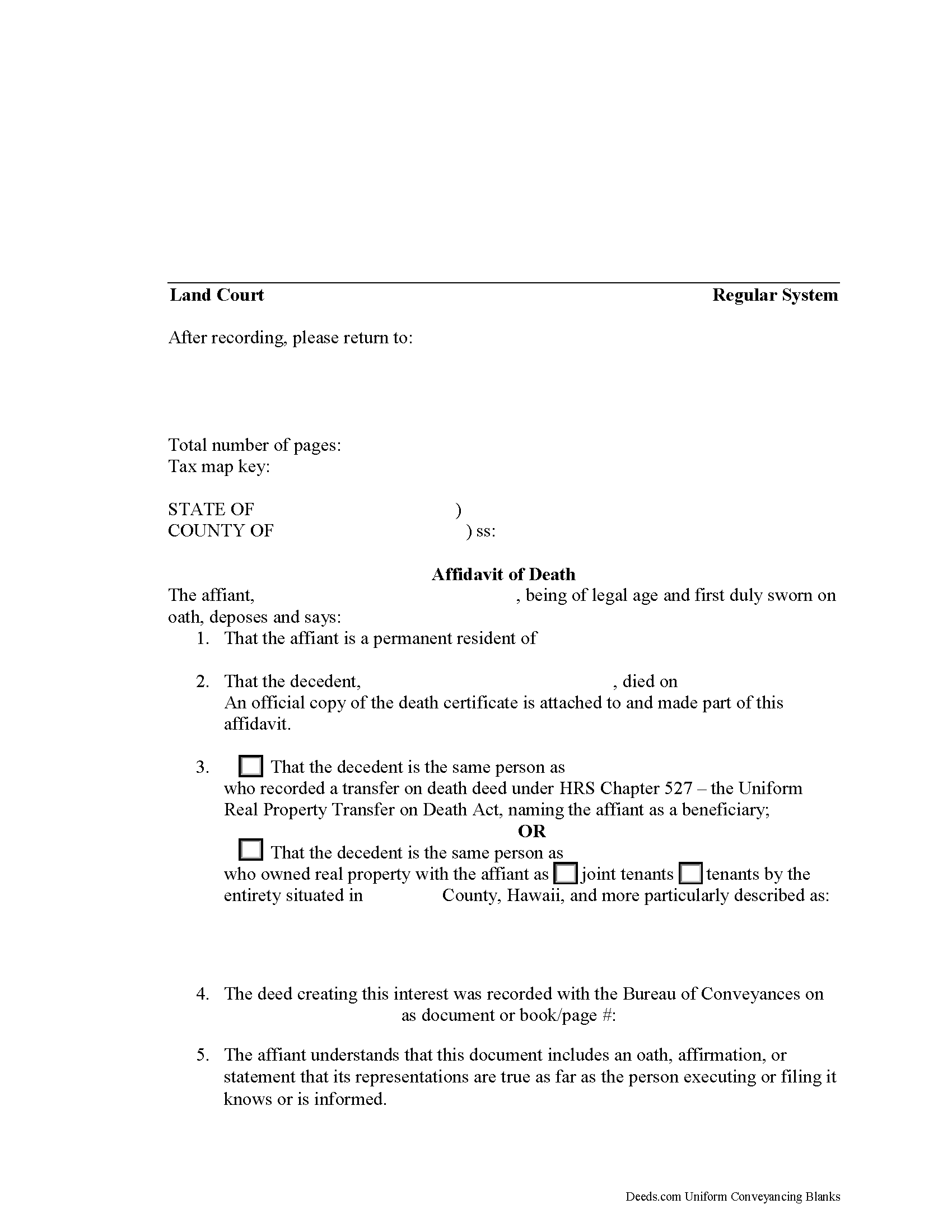
The Hawaii affidavit of death is appropriate for use by a surviving joint tenant or a beneficiary identified in a recorded transfer on death deed.
To formally initiate the transfer of title, record an official copy of the deceased owner's death certificate. Include the affidavit when submitting the death certificate to the Bureau of Conveyances. Additionally, if the property is registered in Land Court, the Certificate of Title must be amended to reflect the death.
This is an important step because it contributes to a clear chain of title (ownership history), which should, in turn, make future sales of the property less complex. It also serves as public notice of the change in the property's status.
Each case is unique, however, so contact an attorney for complex situations or with specific questions.... More Information about the Hawaii Affidavit of Death
Personal Representative Deed

Leaving Real Property to Heirs in Hawaii
Probate is the court-supervised process by which a decedent's property is devised or distributed to heirs upon death. Any property owned by the decedent that is not subject to non-testamentary transfer by a survivorship tenancy, trust, or recorded transfer on death deed must go through probate. The Uniform Probate Code, codified at Title 30A of the Hawaii Revised Code, governs probate proceedings in Hawaii.
After a petition for probate in the circuit court, the court appoints a personal representative (PR) who will handle administration of the decedent's estate. The personal representative's authority is evidenced by issue of letters testamentary or letters of administration, depending on the circumstances. In some cases, a personal representative may be referred to as an executor (when named in the decedent's will) or an administrator (when the decedent dies without a will). Hawaii uses the general term "personal representative" to refer to both.
Priority for appointment of the PR is established at Haw. Rev. Stat. 560:3-203. Once appointed, the personal representative gathers the decedent's assets and assesses the estate. If the ... More Information about the Hawaii Personal Representative Deed
Trustee Deed
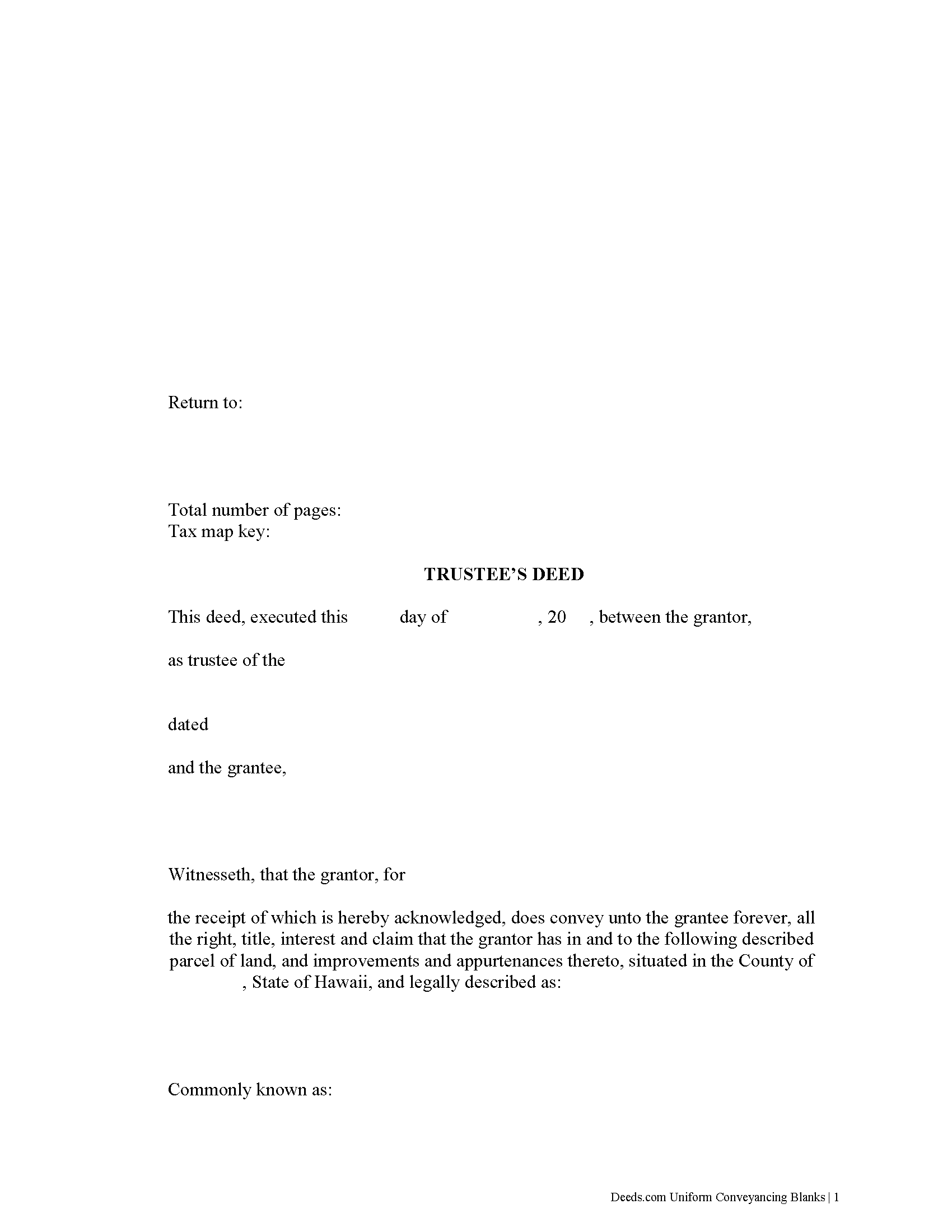
Unlike other instruments of conveyance, which are named for the warranties of title they contain, the trustee's deed is named after the person executing the deed. Trustees use a trustee's deed to transfer real property out of a trust. A trustee's deed for use in trust administration is different from a trustee's deed upon sale, used after foreclosure of real property under a deed of trust.
The trustee of a living trust is appointed by the trust's settlor in the trust instrument. The settlor is the person funding the trust with assets (in this case, real property). Since a trust cannot hold title to property, the trustee acts as an authorized agent of the trust and holds title to the trust's assets. Under direction from the settlor, the trustee can sell real property out of the trust.
A basic trustee's deed conveys title in fee simple to the grantee in exchange for consideration (something of value, usually money). It must meet the same requirements for form and content as other conveyances affecting real property, and it contains additional information about the trust. The deed names the trustee as the grantor and states the trust's name and date of establishment (the date of... More Information about the Hawaii Trustee Deed
Disclaimer of Interest
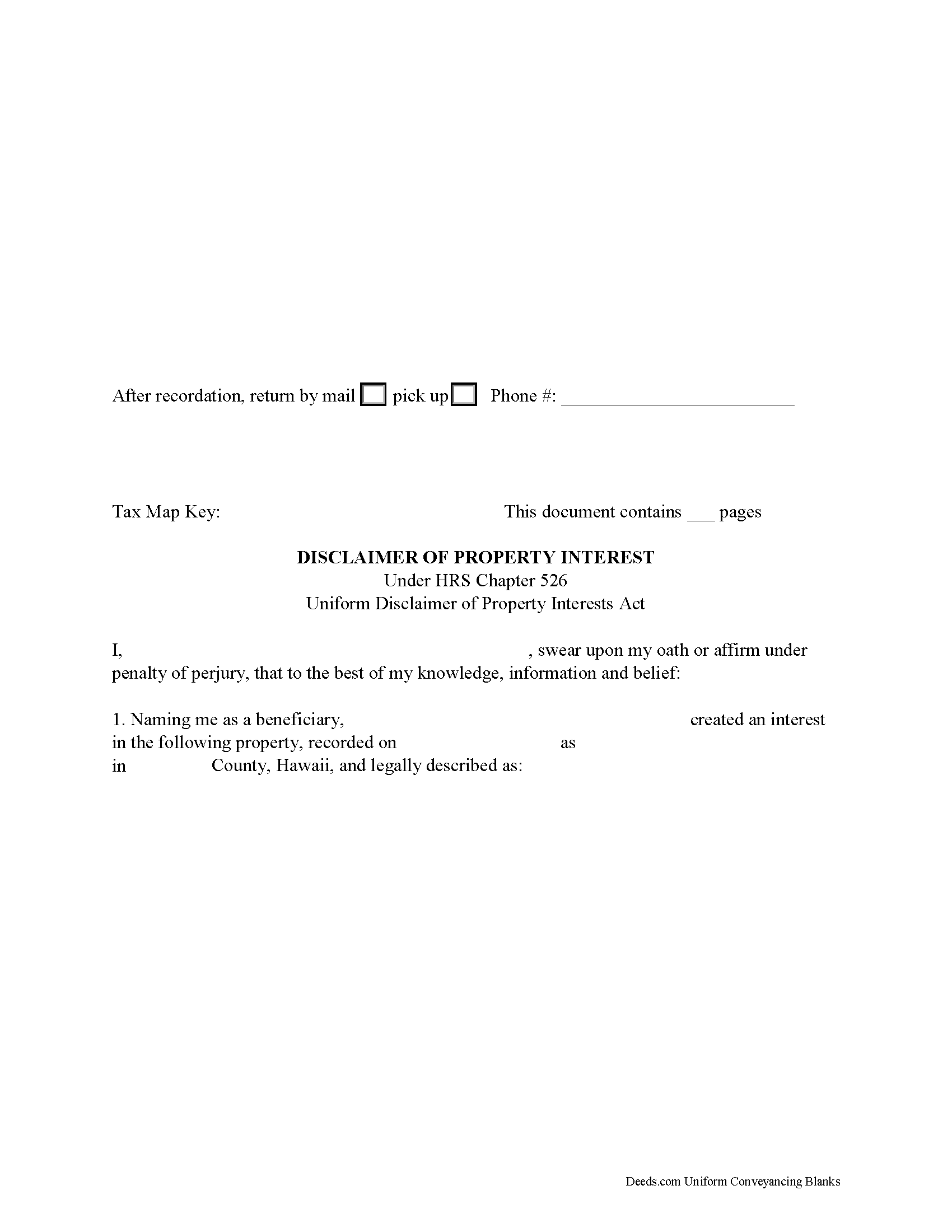
Hawaii Disclaimer of Property Interest
Under the Hawaii Revised Statutes, the beneficiary of an interest in property may renounce the gift, either in part or in full (HRS Chapter 526 Uniform Disclaimer of Property Interests Act). Note that the option to disclaim is only available to beneficiaries who have not acted in any way to indicate acceptance or ownership of the interest ( 526-13).
The disclaimer must be in writing and include a description of the interest, a declaration of intent to disclaim all or a defined portion of the interest, and be signed by the disclaimant ( 526-5 (c)).
Deliver the disclaimer within nine months of the transfer (e.g., the death of the creator of the interest) to the personal representative of the decedent's estate or the trustee, or file it with the court having authority to appoint such a person or to enforce the trust ( 526-12). In order to avoid any ambiguity regarding the chain of title for real property, record a copy of the disclaimer in the Bureau of Conveyances ( 526-6).
A disclaimer is irrevocable and binding for the disclaiming party and his or her creditors, so be sure to consult an attorney when in doubt about the drawba... More Information about the Hawaii Disclaimer of Interest